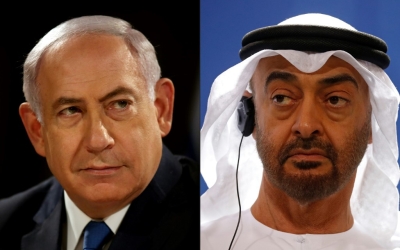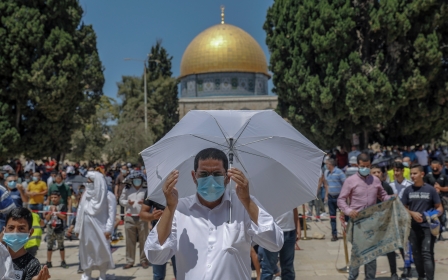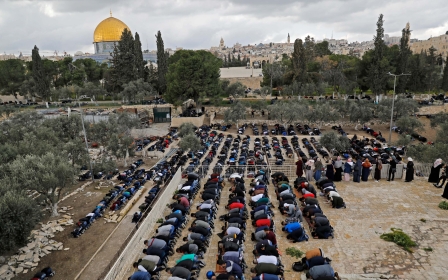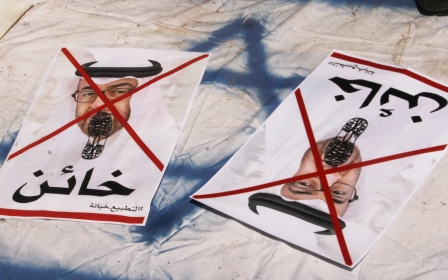How the UAE is exploiting al-Aqsa to market Israel normalisation
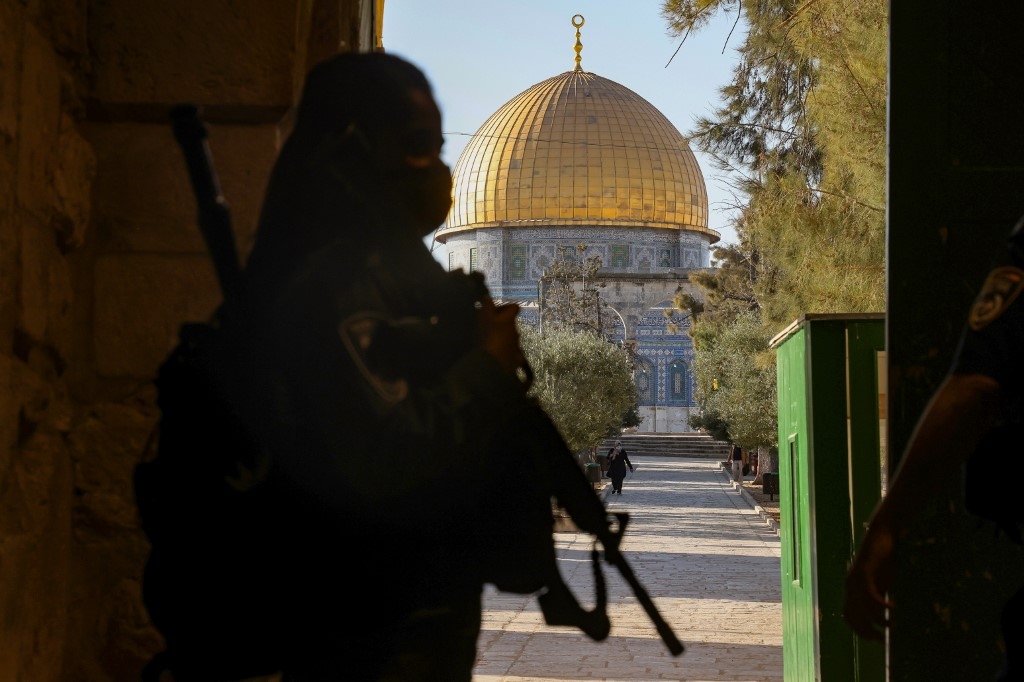
The recent UAE-Israel normalisation deal has fuelled tensions at al-Aqsa Mosque compound, which was already a major flashpoint. The deal aims to increase the number of Emirati worshippers at the mosque, prompting a strong response from Palestinians, who expelled Emirati visitors to al-Aqsa last month.
The rights of Palestinians, Arabs and Muslims at al-Aqsa are being trampled amid media hype over the normalisation deal. The US “peace plan” for Israel-Palestine, released earlier this year, notes that “people of every faith” should be permitted to pray at al-Aqsa, instead of the status quo, which reserves prayer at the site for Muslims.
The UAE’s decision to normalise relations with Israel in a US-backed deal sparked a wave of Palestinian rejection, with huge posters hung at al-Aqsa with the slogan “Mohammed bin Zayed is a traitor”, referencing the Abu Dhabi crown prince. His pictures were set alight, and the Grand Mufti of Jerusalem issued a fatwa banning Muslims from praying at al-Aqsa within the framework of the UAE-Israel deal.
Influx of visitors
US presidential adviser Jared Kushner has encouraged Muslims from Arab Gulf states to pour into al-Aqsa, noting that these crowds could see for themselves that the mosque was not “in danger”, as Palestinians have argued. Israeli and US officials have reportedly discussed a goal of two million Muslim visitors to Israel annually, most of whom would visit al-Aqsa under the banner of “religious peace”. That would be up from 98,000 Muslim tourists to Jerusalem in 2018.
New MEE newsletter: Jerusalem Dispatch
Sign up to get the latest insights and analysis on Israel-Palestine, alongside Turkey Unpacked and other MEE newsletters
“[The] Israeli-Emirati deal raises the concern and fear within the Jordanian Awqaf and among Palestinians, because it aims to give the UAE a new role inside al-Aqsa,” Khaled Abu Arafa, a former Palestinian minister of Jerusalem affairs, told Middle East Eye. “The [Israeli] occupation will push to take security measures to protect its tourists by paving new roads, blocking streets, and limiting the route of Emirati tourists to come via Jewish tour guides, who will circulate their narrative about al-Aqsa and al-Quds.”
It has become clear that all Arab officials who visit al-Aqsa Mosque will be under the auspices of the occupying state
In recent years, Israel has received a number of Arab foreign ministers who have visited al-Aqsa Mosque, including Morocco’s Foreign Minister Nasser Bourita and Oman’s Minister of Foreign Affairs Yusuf bin Alawi in 2018. A Kuwaiti delegation visited last year.
Palestinian Jerusalemites have not forgotten what happened a year ago, when they expelled Saudi blogger Mohammed Saud from al-Aqsa’s courtyard and threw chairs at him. He was not the first to receive such a reception; in 2003, former Egyptian Foreign Minister Ahmed Maher was assaulted and called a “traitor” and “collaborator”.
Ahmed Abu Halabiya, head of the Jerusalem committee within the Palestinian Legislative Council, told MEE that “the Israeli plan is an affirmation of full normalisation between Israel and the Emirates under the umbrella of prayer at al-Aqsa Mosque”. Despite this deal, “Jerusalemites will not allow Emiratis and others to attack the sanctity of al-Aqsa by using prayer to legitimise their null agreement with Israel.”
Legitimising the occupation
It has become clear that all Arab officials who visit al-Aqsa Mosque will be under the auspices of the occupying state. According to a recent report by the NGO Terrestrial Jerusalem, the US-Israel-UAE deal indicates “a radical departure from the status quo, [with] far-reaching and potentially explosive ramifications”.
The three countries’ joint statement in August noted that “all Muslims who come in peace may visit and pray at the al-Aqsa Mosque, and Jerusalem’s other holy sites should remain open for peaceful worshippers of all faiths”. That may be the most dangerous clause in the deal, as it entails a significant change to the holy city’s status quo - to Israel’s benefit.
The Terrestrial Jerusalem report found that by referring only to al-Aqsa Mosque itself, and not the whole Haram al-Sharif compound, the statement suggests that “according to Israel (and apparently to the United States), anything on the Mount that is not the structure of the mosque is defined as ‘one of Jerusalem’s other holy sites’, and open to prayer by all - including Jews. Accordingly, Jews may now be permitted to pray on the Temple Mount, just not in the mosque.”
Khalil Tufakji, a Jerusalem-based political mapping expert, told MEE that he believes “the Emirati approach to Jerusalem was preceded by a Saudi plan to communicate with personalities in Jerusalem to find a foothold in the city, but Palestinians rejected their initiatives. If Emirati worshippers arrived to pray in al-Aqsa Mosque, they would pray only in closed spaces, fearing the Palestinian reaction.”
Alongside the goal of bringing two million Muslims to al-Aqsa, Israel’s minister of Jerusalem affairs, Rabbi Rafi Peretz, announced a plan to bring thousands of tourists from the UAE to Jerusalem to pray and stay in its hotels. All of this is being done in an effort to cement Jerusalem’s status as the “capital of Israel”.
Propaganda machine
Some Palestinian analysts believe the UAE’s plan to bring worshippers to the mosque may not succeed, noting that Emiratis may not come in large numbers, and most are more likely to visit Tel Aviv for tourism and recreation.
The Israeli-Emirati approach has also raised concerns for the Waqf authorities administering the mosque, who fear that the Jordanian and Palestinian roles will be sidelined. The Emirati propaganda machine, in the context of marketing normalisation with Israel, claims that the agreement increases freedom of access for Muslims to visit al-Aqsa Mosque - as though these visits mean freedom from Israeli occupation.
The UAE has already reached an agreement with the Jerusalem municipality to build a technological industrial zone in occupied East Jerusalem’s Wadi al-Joz neighbourhood, at an estimated cost of two billion shekels ($600m).
Jamal Amro, a professor with expertise in Jerusalem affairs, told MEE that “there are Palestinian Jerusalemites involved in the project, who consider themselves envoys of the Emirates in the Palestinian arena. They brainwashed the Jerusalemites to convince them to be involved these projects.”
The views expressed in this article belong to the author and do not necessarily reflect the editorial policy of Middle East Eye.
This article is available in French on Middle East Eye French edition.
Middle East Eye delivers independent and unrivalled coverage and analysis of the Middle East, North Africa and beyond. To learn more about republishing this content and the associated fees, please fill out this form. More about MEE can be found here.




